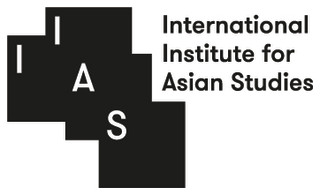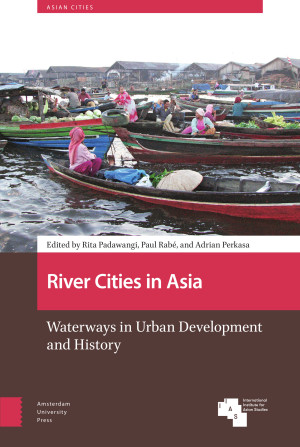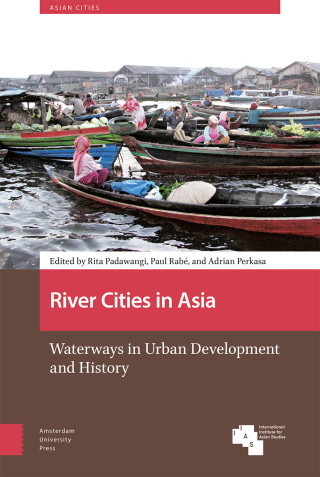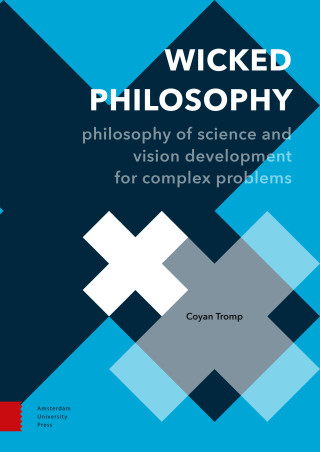

- Titel
- River Cities in Asia
- Subtitel
- Waterways in Urban Development and History
- Redacteuren
- Rita Padawangi
- Paul Rabé
- Adrian Perkasa
- ISBN
- 9789048553372
- Uitvoering
- eBook PDF
- Aantal pagina's
- 294
- Taal
- Engels
- Publicatiedatum
- 15 - 10 - 2022
- Afmetingen
- 15.6 x 23.4 cm
- Open access
- Download op Open Access Platform
- Serie
- Asian Cities
- Partner

- Discipline
- Aziëstudies
- Ook beschikbaar als
- Hardback - € 141,00
List of Illustrations and Captions
Acknowledgments
Chapter 1. River Cities in Asia: Waterways in Urban Development and History (Rita Padawangi, Paul Rabé, and Adrian Perkasa)
Chapter 2. Water World to Inundation: River Cities in Southeast Asia, from Old to New Millenium (Howard Dick)
Chapter 3. From the City to the Sea: Riverside Temple Networks in South India (Emma Natalya Stein)
Chapter 4. The Political Economy of Banjarmasin’s River Landscape during the Sultanate Period (1526–1860) (Vera D. Damayanti)
Chapter 5. Through the Passage and Across the Worlds: The Bridge-and-Temple Complex in the Popular Processions in a ‘Rurban’ Town in Jiangnan Region (Xiaomei Zhao)
Chapter 6. Challenges to an Iconic River-City: Contesting Communities, Threatened Heritage and Endangered Ecology in Varanasi (Pralay Kanungo)
Chapter 7. River-Edge Relationships: A Comparison of Riversides in Indonesian Cities (Michaela F. Prescott)
Chapter 8. Recovering the Stream: River Access as a Catalyst for Political Mobilization in Suwon City, South Korea (Youngah Guahk)
Chapter 9. Water’s Edge Urbanisms along the Buckingham Canal in Chennai (Karen Coelho)
Chapter 10. The Social Downside of Flood Control: The Case of a Marginalized Community in Taipei (Kuei-Hsien Liao)
Chapter 11. Hybrid Riverscapes: Governing River Cities beyond Land and Water Dichotomies—the Yamuna in Delhi, India (Alexander Follmann)
Index
Acknowledgments
Chapter 1. River Cities in Asia: Waterways in Urban Development and History (Rita Padawangi, Paul Rabé, and Adrian Perkasa)
Chapter 2. Water World to Inundation: River Cities in Southeast Asia, from Old to New Millenium (Howard Dick)
Chapter 3. From the City to the Sea: Riverside Temple Networks in South India (Emma Natalya Stein)
Chapter 4. The Political Economy of Banjarmasin’s River Landscape during the Sultanate Period (1526–1860) (Vera D. Damayanti)
Chapter 5. Through the Passage and Across the Worlds: The Bridge-and-Temple Complex in the Popular Processions in a ‘Rurban’ Town in Jiangnan Region (Xiaomei Zhao)
Chapter 6. Challenges to an Iconic River-City: Contesting Communities, Threatened Heritage and Endangered Ecology in Varanasi (Pralay Kanungo)
Chapter 7. River-Edge Relationships: A Comparison of Riversides in Indonesian Cities (Michaela F. Prescott)
Chapter 8. Recovering the Stream: River Access as a Catalyst for Political Mobilization in Suwon City, South Korea (Youngah Guahk)
Chapter 9. Water’s Edge Urbanisms along the Buckingham Canal in Chennai (Karen Coelho)
Chapter 10. The Social Downside of Flood Control: The Case of a Marginalized Community in Taipei (Kuei-Hsien Liao)
Chapter 11. Hybrid Riverscapes: Governing River Cities beyond Land and Water Dichotomies—the Yamuna in Delhi, India (Alexander Follmann)
Index
River Cities in Asia
Waterways in Urban Development and History
De onderstaande tekst is niet beschikbaar in het Nederlands en wordt in het Engels weergegeven.
River Cities in Asia uncovers the intimate relationship between rivers and cities in Asia from a multi-disciplinary perspective in the humanities and the social sciences. As rivers have shaped human settlement patterns, economies, culture and rituals, so too have humans impacted the flow and health of rivers. In Asia, the sheer scale of urbanization increases the urgency of addressing challenges facing urban rivers, leading to the importance of historically, socially, and culturally relevant solutions. However, cities are also uneven landscapes of power, affecting chances to achieve holistic ecological approaches. The central premise of River Cities in Asia is that a “river city” is one where proximity between a river and a city exists across time and space, natural and social dimensions. Recognition of these deep connections can help to better contextualize policy solutions aimed at rivers and their ecologies, including human life.
Redacteuren
Rita Padawangi
Rita Padawangi is Associate Professor (Sociology) at Singapore University of Social Sciences. Her research is on social movements, community engagement, and environmental justice. Rita coordinates the Southeast Asia Neighbourhoods Network (SEANNET), a collaborative urban research and education initiative. She recently published Urban Development in Southeast Asia (Cambridge University Press, 2022).
Paul Rabé
Paul Rabé is Academic Coordinator of the Cities Cluster at the International Institute for Asian Studies (IIAS), Leiden as well as overall coordinator of the Urban Knowledge Network Asia (UKNA) and the River Cities Network: Engaging with Waterways in the Anthropocene (RCN). Paul is also series editor of Amsterdam University Press’s Asian Cities Book Series, and is Lead Expert in Urban Land Governance at the Institute for Housing and Urban Development Studies (IHS), Erasmus University Rotterdam, where he is also joint coordinator of the Urban Environment, Sustainability, and Climate Change academic track. A political scientist by training, with a doctoral degree (2009) in policy, planning and development from the University of Southern California’s Sol Price School of Public Policy, Paul has over 25 years of experience in advisory work, capacity development, research, and teaching on urban policy topics, focused on urban land governance and the intersection of land (use) and the management of water and water bodies in urban and peri-urban areas.
Adrian Perkasa
Adrian Perkasa is a PhD candidate at Leiden University, and a lecturer in the Department of History, Faculty of Humanities, Universitas Airlangga in Indonesia.
Gerelateerde boeken

River Cities in Asia
Rita Padawangi, Paul Rabé, Adrian Perkasa (red.)
The Art of Regenerative Educatorship
Mieke Lopes Cardozo, Koen Wessels, Bas van den Berg (red.)
The Art of Regenerative Educatorship
Mieke Lopes Cardozo, Koen Wessels, Bas van den Berg (red.)

Shortcut or Piecemeal
Jan Winiecki

Wicked Philosophy
Coyan Tromp
